#hellenic festival calendar
Explore tagged Tumblr posts
Text
2025 Ritual Calendar



There is still work to be done, and some graphics on the mobile version that need adjustment. Currently, the website is best viewed on a laptop or desktop, but the mobile version is functional!
Just in time for the new year - our 2025 Ritual Calendar is here! Add it to your Google Calendar for ease of use and remembrance. Every Monthly Observances and Lunar-Solar Festival listed in the Google Calendar has a link to its corresponding page on our website.
Every festival’s historical basis and modern adaptations are listed and described on their corresponding webpages, with links and citations to all sources!
Prefer to have something physical? Free downloads of our minimalistic calendar are available via Google Drive! A PDF version of the entire calendar, as well as PNG images of each month.
ΑΓΑΠΑ ΚΑΙ ΑΓΑΠΗΣΟY: Love and Be Loved
#The Temple of Hyacinthus#temple calendar#festival calendar#ritual calendar#helpol#hellenic polytheism#image and textpost
30 notes
·
View notes
Text
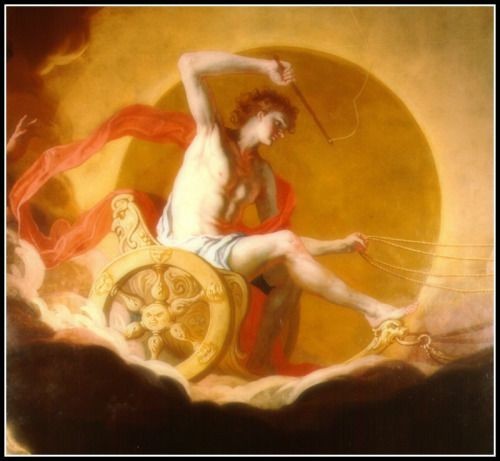
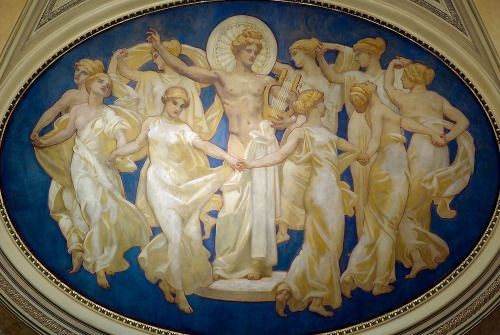
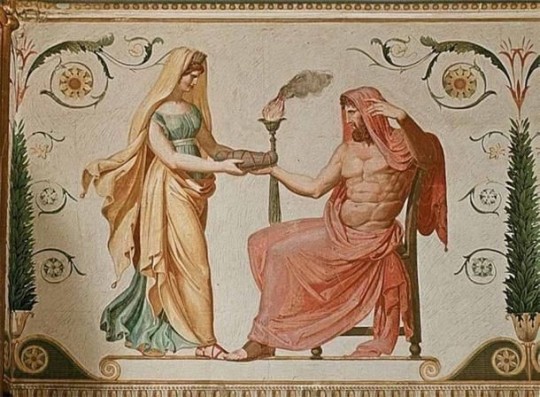
9 Metageitniōn| Μεταγειτνιών (Attic Calendar) - 14th of August/ 20th-24th of August
Helios (Ἡλιος), The Muses (Μουσαι) and Rhea (Ρεια, Μητηρ Θεων)
The Muses are: Melpomene the Muse of tragedy held a tragic mask, Thaleia Muse of comedy a comedy mask, Terpiskhore Muse of dance a lyre, Kalliope the Muse of epic poetry a lyre, Kleio the Muse of history a stylus and scroll, Polymnia the Muse of hymns a veil and pensive pose, Ourania the Muse of astronomy a globe, Erato the Muse of erotic poetry a lyre, and Euterpe the Muse of lyric poetry a flute.
Hesiod, Theogony 1 ff (trans. Evelyn-White) (Greek epic C8th or 7th B.C.) :
"Of the Mousai Helikoniades (of Helikon) let us begin to sing, who hold the great and holy mount of Helikon, and dance on soft feet about the deep-blue spring and the altar of the almighty Kronion [Zeus], and, when they have washed their tender bodies in Permessos [stream of Helikon] or in the Hippokrene (Horse's Spring) or Olmeios [stream of Helikon], make their fair, lovely dances upon highest Helikon and move with vigorous feet"

Rhea, Mater Megala
Antoninus Liberalis, Metamorphoses 19 (trans. Celoria) (Greek mythographer C2nd A.D.) :
"In Krete there is said to be a sacred cave full of bees. In it, as storytellers say, Rhea gave birth to Zeus; it is a sacred place an no one is to go near it, whether god or mortal. At the appointed time each year a great blaze is seen to come out of the cave. Their story goes on to say that this happens whenever the blood from the birth of Zeus begins to boil up. The sacred bees that were the nurses of Zeus occupy this cave."

Ἡλιος
HELIOS (Helius) was the Titan god of the sun, a guardian of oaths, and the god of sight. He dwelt in a golden palace in the River Okeanos (Oceanus) at the far ends of the earth from which he emerged each dawn, crowned with the aureole of the sun, driving a chariot drawn by four winged steeds. When he reached the the land of the Hesperides in the far West he descended into a golden cup which bore him through the northern streams of Okeanos back to his rising place in the East.
Homeric Hymn 31 to Helius (trans. Evelyn-White) (Greek epic C7th - 4th B.C.) :
"Glowing Helios (Sun) whom mild-eyed Euryphaessa (Wide Shining), the far-shining one, bare to [Hyperion] the son of Gaia (Gaea, Earth) and starry Ouranos (Uranus, Heaven). For Hyperion wedded glorious Euryphaessa, his own sister, who bare him lovely children, rosy-armed Eos (the Dawn) and rich-tressed Selene (the Moon) and tireless Helios (Helius, the Sun) who is like the deathless gods."
#hellenistic#hellenic deities#hellenic pagan#hellenism#hellenic polytheism#hellenic worship#hellenic calendar#festivals#rhea#helios#the muses#deity#deity work#deity worship#pagan#paganism#paganblr#sources#greek#greek literature#greek deities#greek tumblr#greek mythology#greek gods#greek myth#greek myth art#greek posts#ancient greece#pagan witch#apollo
34 notes
·
View notes
Text

Father's Day June 18, 2023
A small shrine to Patér Zeus.
A libation of water was given. Prayers of gratitude for his presence in my life, as well as thanks for the four fathers in my life both alive and deceased. The vase is something given to me by my pappous— Greek grandfather so I thought it appropriate, I only wish I had some flowers for it. I invoke Patér Zeus with ASMR and when I need comfort like that of a parent.
This shrine is located in a high location which wasn't the best during the small prayer and libation but I did what I could.
Happy Fathers Day to all the deserving Fathers out there and to splendid Patér Zeus 🏺🔥🏺
#helpol#zeus#shrine#altar#hellenic polytheism#patér zeus#father zeus#holiday#festival#i should make mothers day and fathers day part of my religious ''calendar''#izkurereshkigal altars#been pushing myself a bit today#i decided this was more important than a full cleanse of my main shrine since i want to do that on the solstice#four as in 4 not fore lmao
53 notes
·
View notes
Text
I'm starting my Lenaia celebration today!
This is the first time I'm celebrating it so theres not much I have on my plans for it.
If I wanna be extra I might go out at night to pour libations for Dionysus but the weather is awful as always.
Other than that I'm just gonna dance, watch slime tutorials and drink in his honor! 😎
Hope everyone can have as much fun as possible!
#hellenic pantheon#hellenic polytheistic#hellenismos#pagan#paganism#polytheist#hellenic devotees#hellenic worship#hellenism#hellenic polythiest#attic calendar#hellenic festivals
3 notes
·
View notes
Text
Festivals & Calendars
The equinox. The time when night and day are equal. It occurs only two times a year. Tomorrow, September 23, 2023, is when the Autumnal Equinox falls for those in the Northern Hemisphere. In the Southern Hemisphere, is the Spring Equinox. For some people and cultures, this is a time of festivity.
When it comes to festivals in Hellenic Polytheism, it can be a bit overwhelming for worshipers to figure out. The Ancient Greeks had a lot of festivals throughout the years. Athens alone had about 120 days worth of festivals. Each city-state had their own festival calendars with some festivals being pan-Hellenic. That is, they were celebrated across all of Ancient Greece, such as the Olympia.
When starting to construct a festival calendar, many people will use the Attic calendar. Otherwise known as the Ancient Athenian calendar. The reason for that, is simply because that it is the calendar we happen to have the most information on. From the names of the months to information on the festivals, it is the calendar that is best if you are looking to simply translate the ancient calendar to your modern day calendar.
Modern day worshipers may find themselves stuck on what festivals they should celebrate and when. Some festivals we only have the names of, others we only know approximately when they were celebrated. Even though I have been a Hellenic Polytheist for about 8 years now, I still find myself struggling with figuring out the festival calendar. As a solitary worshiper, though not out of choice, it can be a bit difficult to celebrate certain festivals the same way the Ancient Greeks did and even a bit lonely at times. Between being solitary and also living in a different climate zone than the ancient and modern Greeks, I have to make a few adaptations to the festivals.
The few things that remain the same are the Deipnon (the last of the month) and the Noumenia (the first of the month). The second of the month is often dedicated to the Agathos Daimon (good spirit). Because the calendar is a lunisolar calendar, the first of the month falls on the new moon. For modern people, the new moon occurs when the moon is 100% dark, but for the ancients, the new moon occurs when the moon is just starting to be seen again after going dark. When I was constructing my calendar, I chose to place the Noumenia the day after the modern new moon (when it was 100% dark) which places the Deipnon on the day of the modern new moon.
However, because 12 lunar months are about 11 days shorter than a solar year, the months can start to slide back and become misaligned with the seasons. To fix this, the Ancient Athenians added in an extra month every three years. I tend to just add in an extra month after Poseideon in December. It's just called Poseideon II.
Having that beginning and end set in the calendar makes it much easier to decide when to place the festivals. At least, those we know the dates of. For example, we know that Thargelia was celebrated on the 6th and 7th of Thargelion, and we know that Thargelion occurs in May/June.
For the Ancient Athenians, the year began with the first new moon after the summer solstice. The first month of the year is called Hekatambaion. The months after that are as follows:
Metageitnion
Boedromion
Pyanepsion
Maimakterion
Poseideon
Gamelion
Anthesterion
Elaphebolion
Mounichion
Thargelion
Skirophorion
And of course, every three years there will be an extra month. Each month is about 29 or 30 days long as the moon's orbit around the Earth is 29.5 days long.
When it comes to setting up the calendar, I found this site (epistemeacademy.org) to be very helpful. I made very few, if any, tweaks to the festival dates.
In regards to the festivals, I usually place them on the same days the Ancients did with the exception of some agricultural festivals. Since I live in a different climate zone, my local harvests start just a little later in the year, though not by much. I also don't celebrate every single festival that the ancients did. That's a lot of festivals to celebrate. I generally just stick to one or two festivals a month depending on the length of the festival. Additionally, some festivals will be celebrated for the full original time frame, and others will be shortened to accommodate my own (and society's) needs. Unfortunately, I can't always celebrate for seven days straight.
Some of the festivals I personally celebrate are the Dionysia (both parts), Kronia, Thargelia, Panathenaia, and more. I'll talk more in depth about the specific festivals I celebrate as they come up as this post has already really long.
I am by no means an expert. All of this is simply based on my own experience and the research I’ve done intermittently over the course of 8 years. Please be sure to do your own research as well. The site that I linked above (epistemeacademy.org) links information about the festivals that are listed in the calendar. You can also find books and articles using Google Scholar (would highly recommend). If you believe that I may have gotten something wrong or if there is something I missed, please let me know. Definitely provide links if you have them.
6 notes
·
View notes
Text
hey, there know anything about ancient greek festivals for the gods ???
Kinda a desperate outreach but from the ancient greek religious calendars I've seen they're all sooooo confusing to me and I don't have any saved anywhere nor do I know where to find information on the festivals. Right now I am currently researching on theoi.com but would love it if anyone could reblog/comment with any help at all! :)
#hellenic devotion#deity worship#hellenic pagan#dionysus#apollo worship#apollo#dionysus devotee#aphrodite#helios#ancient greek festivals#hellenic calendar#helpol
5 notes
·
View notes
Text
2024 Rural Dionysia Announcement

Io! The time of the year has come again for the Rural Dionysia!
How to participate
The Rural Dionysia is meant to be a smaller competition than its urban counterpart, as such, we have selected only 3 categories:
Freestyle poetry
Modern hymns
“Complete the fragment”
Freestyle poetry
Your poem can be about any chosen topic (myth, personal experience etc.) in any written format. It doesn't have to be religious in nature.
Modern hymn
An hymn must sing the praises of a deity of your choice. Unlike the "freestyle poetry", your work must be of religious nature to fit in this category.
Complete the Fragment
Each year, we choose a fragment from an Ancient Greek poet to work with. The challenge is that the initial fragment must be included somewhere in your piece in its original order. This means you can fill the gaps however you want, but you can’t switch the order of the words in your piece or remove words from the original fragment.
Here is the fragment selected for this 2024 edition:
Fragment 113 by Alcaeus (trans. David A. Campbell; Loeb 142)
…kiss…(they) began…knowledge…sits…are…mortal
Here is the Greek text for reference. Note that because the word "they" is implied, it will be acceptable to keep or modify this word.

If in doubt for any of these categories, remember that you can check submissions from the previous years to get an idea of how others have done before.
Submitting your piece
Please submit your piece through submissions on this blog. All entries must be tagged for the category they are being submitted to. but you can only choose 1 category per piece and each person may only submit 1 entry per category each year.
Entries must also be tagged for potentially triggering content and squicks. If your entry needs a trigger warning, kindly add them at the end of your submission and we will take care of adding them in. Check the rules below for further information about submissions.
Calendar of the event
Nov. 16: Official announcement and opening of submissions. Dec. 17: Final submission day. Dec. 18: Vote opening. Dec. 25: Vote closing. Dec. 25-26: Announcement of the winners!
No worries though! We will be posting reminders about each step when the time comes.
General rules
Roleplay and fanfic are not acceptable submissions. This is a religious festival, please respect our faith and do not submit an entry if you are roleplaying or writing fanfiction.
Unlike with the City Dionysia, entries do not necessarily have to be about specific deities or Hellenic polytheism except for the “Modern Hymn” category, which has to be dedicated to one or many gods of your choice.
There are no meter restrictions. This is up to the writer.
All stories, myths, and poems must be entered using the submissions button.
All entries must be tagged for the category they are being submitted to. Entries must also be tagged for potentially triggering content and squicks.
An entry may only be submitted to a single category.
Each person may only submit one entry per category each year.
Winners for each category will be decided by popular vote.
Admins of this blog cannot participate, for obvious reasons. As for now, this includes @thegrapeandthefig @verdantlyviolet
Questions about the rules? Check the blog for past answers, your answer might be in there. And if it's not, simply submit an ask. We'll answer in the best delays possible.
#dionysusdeity#hellenismos#hellenic paganism#hellenic polytheism#hellenic gods#country dionysia#hellenic festivals#hellenic pagan#hellenic worship#hellenic revivalism#hellenic reconstructionism
268 notes
·
View notes
Text
Hey OP, if you’re using the Attic (or Athenian) calendar and keeping track by the moon, your location may place the lunar days slightly differently than Athens! You are probably doing just fine!
Which calendar are y'all using that tells you Theogamia was yesterday? I thought I'd finallyyy got a handle on the festivals this year but my calendar has it as being tomorrow 😭 I missed it again 😭
#hellenic polytheism#hellenic deities#hellenic pagan#hellenic paganism#greek gods#theogamia#hellenic festivals#hellenic devotion#helpol#hellenic reconstructionism#calendars
29 notes
·
View notes
Text
Every Pagan Holiday

JANUARY
KALENDS
1st January
Origins: Ancient Greece/Rome
Observed by: Hellenic/Roman polytheists
Honouring Janus/Juno, first day of the Year. Kalends brought us the word 'calendar'.
ÞORRABLÓT (THORRABLÓT)
End of January/beginning of February
Origins: Iceland
Observed by: Heathens, Asatru
Midwinter Festival honouring Thor, usually by feasting and poetry.

FEBRUARY
IMBOLC
2nd February
Origins: Celtic polytheism /Ireland, as St. Brigid's Day
Observed by: Most neopagans, Wiccans, Druids, Asatru (as Charming of the Plow)
Imbolc is the most widely known and observed pagan holiday in the months of January and February. It falls at the beginning of spring/end of the winter for the Celtic peoples; marking the changing of the seasons, as most holidays do. St. Brigid is a Christianised form of or inspired by the Celtic fertility goddess Brigid who is celebrated on this day.
PARENTALIA
13th-21st February
Origins: Ancient Rome
Observed by: Greco-Roman polytheists
Translating to 'Ancestors Day', Parentalia is a nine-day celebration of deceased ancestors. Historically it was observed by feasting and making offerings and sacrifices to the dead and spirits of the underworld.
VÁLI'S BLOT
14th February
Origins: Old Norse
Observed by: Heathens, Asatru, Norse polytheists
Váli's Blot is considered by some Asatru to be the Norse equivalent of Valentine's Day but is widely acknowledged as a season changing festival. A day for marriage and celebrating with family and friends, and for remembrance of Váli, the son of Odin who defeated Höðr on this day.
LUPERCALIA
15th February
Origins: Ancient Rome
Observed by: Greco-Roman polytheists
Festival thought to honour a wolf who raised abandoned princes, celebrated originally by sacrificing goats to the gods, feasting, and, for fertility, nudity and fornication.
LESSER ELEUSINIAN MYSTERIES
17th-23rd February
Origins: Ancient Greece
Observed by: Hellenic polytheists
Initiation to the cult of Persephone and Demeter by sacrificing a pig. Prelude to Greater Mysteries, initiations held on these dates. Once completed, initiates could then move onto Greater Mysteries in the autumn.
ANTHESTERIA
27th February - 1st March 2021
Origins: Ancient Greece
Observed by: Hellenic polytheists
Athenian festivals dedicated to Dionysus and the dead. Held around the full moon in the month of Anthesterion, which in the Gregorian calendar this year roughly translates to 27th February.
THE DISTING/DÍSABLÓT
End of February/beginning of March
Origins: Uppsala, Sweden
Observed by: Heathens, Asatru, Norse polytheists
Celebration of Valkyries and other female spirits, called dísir. Sacrifices were made for a good harvest. Celebrated still by an annual market in Sweden.
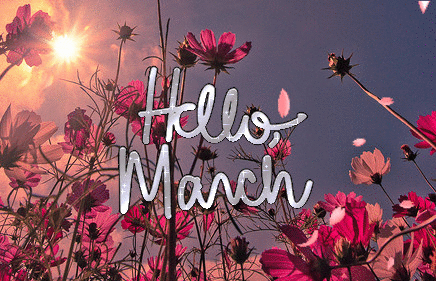
MARCH
KALENDS
1st March
Origins: Ancient Greece/Rome
Observed by: Hellenic/Roman polytheists
Honouring the god Mars/Ares. Kalends brought us the word 'calendar'.
OSTARA/EARRACH
20th March
Origins: Anglo Saxon paganism, popularised as Ostara by Wicca
Observed by: Anglo Saxon Pagans, Wiccans, Neopagans, Druids (as Alba Eilir), Heathens (as Summer Finding), Ásatrú (as Sigrblót)
The northern hemisphere's vernal equinox, the word Ostara was introduced though Wicca and named for the goddess Eostre. Surprisingly unrelated to Easter in all but name, Ostara symbolises the beginning of spring. As a seasonal holiday it is widely celebrated by many different groups of pagans.
RAGNAR LODBROK'S DAY
28th March
Origins: Icelandic Sagas
Observed by: Ásatrú
Day of remembrance for Ragnar Lodbrok, Viking King of legend

APRIL
KALENDS/VENERALIA
1st April
Origins: Ancient Greece/Rome
Observed by: Hellenic/Roman polytheists
Celebration of the first of the month, this one honouring the goddess, Venus.
REMEMBRANCE FOR HAAKON SIGURDSSON
9th April
Origins: Norway, C9th
Observed by: Ásatrú
Day of remembrance for ruler of Norway who claimed lineage to Odin in the Icelandic Sagas.
WALPURGISNACHT
30th April
Origins: German Christianity, originally Saint Walpurga was known for banishing witches and other pests
Observed by: LaVeyan Satanists
Anton LaVey chose to celebrate this holiday as a follow up to the spring equinox and due to its past association with witchcraft.
HEXENNACHT (WITCHES' NIGHT)
30th April
Origins: German folklore, as Walpurgisnacht but witches were alleged to convene with the devil in this night
Observed by: Temple of Satan as 'a solemn holiday to honour those who were victimized by superstition'.
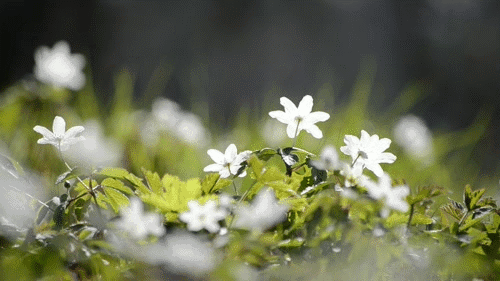
MAY
BEALTAINE/BELTANE
1st May
Origins: Celtic (Ireland/Scotland/Isle of Man)
Observed by: Wiccans, Neopagans, Celtic reconstructionist, Ásatrú/Heathens (as May Day)
One of the more well-known pagan festivals, Beltane is a festival of fire and the beginning of the summer. Also widely referred to as May Day, it is celebrated by lighting fires.
KALENDS
1st May
Origins: Ancient Greece/Rome
Observed by: Hellenic/Roman polytheists
Honouring the goddess Maia, for whom the month may have been named.
REMEMBRANCE FOR Guðröðr of Guðbrandsdál
9th May
Origins: C11 Norway, Icelandic Sagas
Observed by: Ásatrú, Norse, heathens
Guðröðr had his tongue removed by Óláfr for rebelling against violent conversion from Norse paganism to Christianity.

JUNE
KALENDS
1st June
Origins: Ancient Greece/Rome
Observed by: Hellenic/Roman polytheists
Anniversary of temples to Juno Moneta (protectress of money, her temple was where coins were made), Mars/Ares (God of war), and the Tempestates (goddesses of storms).
ARRHEPHORIA
3rd Skirophorion (translates to mid-June)
Origins: Ancient Greece
Observed by: Hellenic reconstructionist
Feast in celebration of Athena and fertility.
MIDSUMMER/SUMMER SOLSTICE
21st June
Origins: Agricultural holiday/longest day observed for centuries by many civilisations. Christianity can date to as early as C4th
Observed by: Wiccans/Germanic neopagans (as Litha), Asatru/Heathens, Druids (as Alban Hefin)
One of the main four holidays in the Wheel of the Year and popularised by Wiccans and neopagans as Litha which is taken from the Anglo-Saxon words for June/July, this is the longest day of the year and the middle point and sometimes considered the beginning of summer.

JULY
REMEMBRANCE FOR UNNR/AUD THE DEEP MINDED
9th July
Origins: C9th Iceland
Observed by: Ásatrú, Heathens, Norse reconstructionist
Aud was a traveller in the 9th century moving between Dublin, the Hebrides, Orkney, and finally Iceland following the deaths of her husband and son. This day is to honour her memory.
HERACLEIA
July/August
Origins: Ancient Greece
Observed by: Hellenic polytheists
Festival dedicated to Heracles the demigod and his death, involving feasting and celebration.

AUGUST
LUGHNASADH/LAMMAS
1st August
Origins: Celtic Britain (Ireland, Scotland, Isle of Man)
Observed by: Wiccans, Neopagans, Christians (as Lammas), Ásatrú (as Freyfaxi)
Named for the god Lugh, this festival is one of the Celtic harvest festivals and marks the beginning of the harvesting months. It was celebrated by climbing mountains, bull sacrifice, offerings, and feasting. Handfasting is commonplace with Wiccans in modern times.
REMEMBRANCE FOR REDBAD, KING OF THE FRISIANS
9th August
Origins: C7th Frisia (area of Germany/Netherlands)

SEPTEMBER
NOUMENIA
8th September
Origins: Ancient Greece
Observed by: Hellenic polytheists
Celebration of new Hellenic lunar month. Offerings of honey and incense made to household deities.
REMEMBRANCE FOR HERMANN THE CHERUSCAN
9th September
Origins: C9th CE
Observed by: Heathens, Ásatrú
Hermann the Cheruscan, also known as Arminius of the Cherusci tribe, led the defeat against the Romans at the Battle of Teutoburg Forest and is lauded for saving Eastern Germanic peoples from being conquered by the Roman Empire.
AUTUMN EQUINOX (NORTHERN HEMISPHERE)
22nd September
Origins: 1970s neopaganism
Observed by: Wiccans and Neopagans (as Mabon), Ásatrú (as Winter Finding)
Named Mabon by prominent Wicca and Neopagan Aidan Kelly, after the Welsh mythological figure Mabon ap Moldron, the autumn equinox is one of the harvest festivals and marks the beginning of autumn in the northern hemisphere. Mabon is a relatively new pagan holiday not based on any specific historical festival, but traditionally people around the world would celebrate some kind of harvest festival around the end of September/beginning of October.
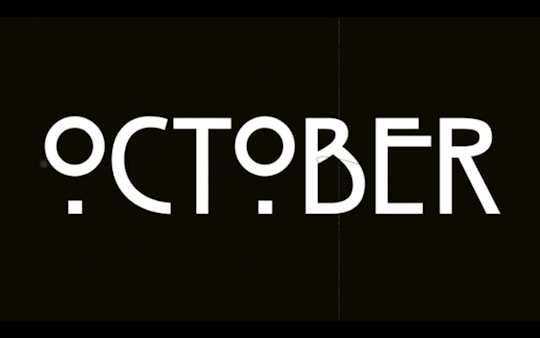
OCTOBER
PYANOPSIA
7th October
Origins: Ancient Greece
Observed by: Hellenic polytheists
Pyanopsia, or Pyanepsia, is a festival to honour Apollo, one of the most important deities, God of music, the sun, knowledge, healing, and archery - amongst other things. During the festival, two special offerings would be placed on doorways and carried to the temple. These offerings were a bean stew, and an olive branch wrapped in wool with honeys, pastries and seasonal fruits hanging from it.
REMEMBRANCE FOR LEIF EIRIKSSON
9th October
Origins: C10th CE
Observed by: Heathens, Ásatrú, Norse pagans
Remembrance for Leif and his sister Freydís Eiríksdóttir, children of Erik the Red, who are cited with being the first Norse explorers in North America.
THESMOPHORIA
12th-14th October
Origins: Ancient Greece
Observed by: Hellenic polytheists
Festival held in honour of Demeter Thesmophoros, goddess of agriculture, and her daughter Persephone, goddess of death and life, Queen of the Underworld. Celebrated primarily by women, this festival is linked with fertility, and we know very little about it due to its secretive rites. It is thought that it involved the sacrifice of pigs (although some sources say women), and abstinence.
REMEMBRANCE FOR ERIK THE RED
28th October
Origins: C9th CE
Observed by: Heathens, Ásatrú, Norse pagans
Erik the Red, probably named for the colour of his hair and beard, was the first permanent European settler in Greenland. His children were explorers too, who went to America, and although his wife converted to Christianity, Erik remained faithful to his Norse pagan gods.
SAMHAIN (HALLOWE'EN)
31st October-1st November
Origins: Gaelic - Scotland, Ireland, Isle of Man
Observed by: Celtic pagans, Neopagans, Wiccans
Pronounced SOW-in (sow rhyming with cow), Samhain was originally a harvest festival marking the beginning of winter. The day itself is the 1st November, but celebrations begin on October 31st, and this has become the accepted associated day. It's a festival of the dead, where the síthe, fae and spirits, can enter this realm from their own. Wiccans talk of a 'veil' thinning, meaning the boundary between worlds. Similar death related festivals around this time can be noted in other faiths from across the globe, and of course in the modern Hallowe'en.
WINTER NIGHTS (VETRNAETR), ÁLFABLÓT/DÍSABLÓT
31st October
Origins:
Celebrated by: Heathens, Ásatrú, Norse pagans
Winter Nights is mentioned in the Ynglinga Saga as one of the three greatest blessings of the year, the other two being Sigrblót in April, and þorrablót in late Jan/early Feb. Winter Nights is the celebration of the beginning of the winter season; Álfablót is a sacrifice to the elves, and Dísablót a sacrifice to the female spirits (dísir) and Valkyries.

NOVEMBER
REMEMBRANCE FOR SIGRID THE HAUGHTY
9th November
Origins: C9th CE
Observed by: Heathens, Ásatrú, Norse pagans
It is not actually known whether Sigrid Storråda, or Sigrid the Haughty, was an actual historical figure, an amalgamation of a few, or simply a myth. The lore goes that she was proposed to multiple times and turned down many but went on to orchestrate conflict when a potential suitor - Olaf Tryggvason, King of Norway - attempted to convert her to Christianity.

DECEMBER
REMEMBRANCE FOR EGILL SKALLAGRÍMSSON
9th December
Origins: C10th CE
Observed by: Heathens, Ásatrú, Norse pagans
Day celebrating the poet, farmer, and berserker Egill Skallagrímsson, who is recalled in The Icelandic Sagas by Snorri Sturluson. Egill is known for his many killings and escaping death by writing an epic poem after being captured when washing up on our Northumberland coastline.
SATURNALIA
17th - 23rd December
Origins: Ancient Rome
Observed by: Roman polytheists, some Hellenic
Like Yule and Lesser Dionysia, Saturnalia was the Roman winter festival celebrating the coming return of the sun and honouring the god Saturn. The standard feasting and drinking feature, and slaves would be treated as equals like Dionysia. Saturnalia is another festival cited as being picked up by Christians and used as inspiration for Christmas.
WINTER SOLSTICE (YULE/MIDWINTER)
21st December
Origins: Germanic nations, as early as C4th CE
Observed by: Norse pagans, Wiccans, Neopagans, LaVeyan Satanists, Ásatrú, Heathens, many Germanic nonpagan peoples
Yule is the midwinter festival known commonly among pagans as a time for feasting, being with loved ones, remembering ancestors, and looking forward to the return of the light and warmer days. Many pagans will celebrate Yule for more than one day, some celebrating a week either side, some for longer, up to two months, and some for twelve days afterwards. True Yule would have originally been in January for midwinter, but King Haakon the Good
moved it to coincide with the Christian celebrations in the 10th century, as told in the Ynglinga Saga.
On the 24th of December, Anglo Saxons are said to have celebrated 'Mothers Night' honouring female ancestors.
RURAL/LESSER DIONYSIA
End of December/beginning of January
Origins: Ancient Greece
Observed by: Hellenic polytheists
Smaller festival honouring the god Dionysus (Greater Dionysia took place in cities at the end of winter). Feasting, mask wearing to stop distinction between classes so that everyone could feel equal, sacrifices, parades, and phallic display were all used to celebrate.
#wheel of the year#wiccan#pagan#heathen#greek#mythology#holidays#religious holidays#pagan holidays#non-Abrahamic holidays#witch#witchcraft#witchblr#pagan wicca#polytheism#paganism#witches#witch holidays#witches holidays#pagan witch
277 notes
·
View notes
Text
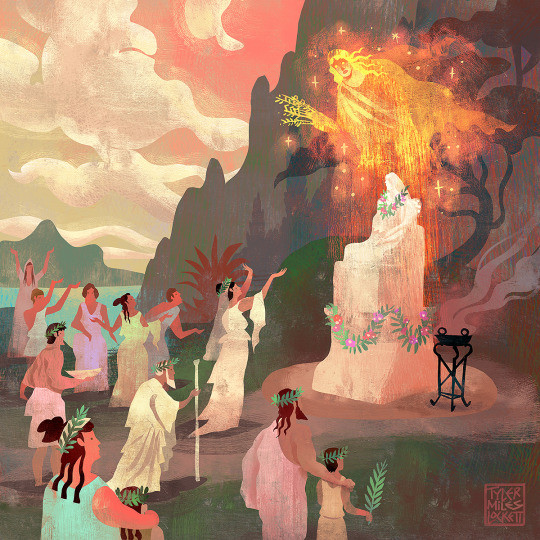
Hellenic Polytheism or Hellenismos is the traditional, polytheistic (multiple gods) religious belief system of Ancient Greece. Modern people who believe in pre-Christian and polytheistic belief systems often refer to themselves as pagans. Let’s look at some of the general practices of typical Hellenic worship.
Hellenic Polytheists use altars or shrines to worship specific Gods within the Greek Pantheon. For example, an altar for Apollo may contain an image or sculpture bust of the god, as well as a side table, called a trapezōmata, which holds offerings of incense and flowers or food and drink such as wine, honey, milk, or olive oil. Another tripod incense holder was called a Thymiateria.
Before engaging in a ceremony, the practitioner will employ purification methods with lustral water (ritually cleansed). They may recite hymns or prayers in honor of the god, using the Homeric hymns for example. The practitioner may use a divination practice to seek guidance or gain insight from a god through methods like casting lots, reading signs from nature, oracle prophecies, and dream interpretations. In their ceremonies, ancient Greeks would perform rites in respect to their Ta Patria, (ancestral homeland heritage), and they would take pride in their reverence with Hos Kallista, or the highest level of beauty.
Hellenic Polytheism follows annual calendar festivals commemorating Gods or famous mythological events such as the Panathenaia in Athens (commemorating Athena), the Anthesteria and City Dionysia; (festivals celebrating Dionysus) The Olympics (a physical competition in honor of Zeus) and the Thargelia, (dedicated to Apollo and Artemis), and the Thesmophoria, (a festival exclusive to women in honor of Demeter), among many others.
Want to own my Illustrated Greek myth book jam packed with over 130 illustrations like this? Support my kickstarter for my book "lockett Illustrated: Greek Gods and Heroes" coming in October.You can also sign up for my free email newsletter. please check my LINKTREE:
#pagan#hellenism#greek mythology#tagamemnon#mythology tag#percyjackson#dark academia#greek#greekmyths#classical literature#percy jackon and the olympians#pjo#homer#iliad#classics#mythologyart#art#artists on tumblr#odyssey#literature#ancientworld#ancienthistory#ancient civilizations#ancientgreece#olympians#greekgods#zeus#hesiod
576 notes
·
View notes
Text
January 2025 Hellenistic Festivals and Holy Days

Here is a quick guide for the calendar:
Modern Julian Calendar Date
(Attic Lunar Calendar Date )
🏛 Holy Day 🏛
🥂 Festival 🥂
Resources are in the bottom of the calendar!
Wednesday January 1 (1 Gamelion)
🥂 Festival 🥂
Noumenia
The most important of the three recurring monthly festivals. This is the first day of the Attic month of Gamelion. Traditionally Zeus, Apollon Noumenios, Apollon Agyieus, Artemis, Hermes, Selene, personal matrons and patrons and other deities you and your family are close to are traditionally honored.
Thursday January 2 (2 Gamelion)
🥂 Festival 🥂
Agathos Daimon
In honor of the Agathos Daimones who look after you and your family. Ancestor veneration may also be done on this day.
Friday January 3 (3 Gamelion)
🏛 Holy Day 🏛
Sacred to Athena
Saturday January 4 (4 Gamelion)
🏛 Holy Day 🏛
Sacred to Aphrodite, Herakles, Hermes and Eros
Sunday January 5 (5 Gamelion)
Monday January 6 (6 Gamelion)
🏛 Holy Day 🏛
Sacred to Artemis
Tuesday January 7 (7 Gamelion)
🏛 Holy Day 🏛
Sacred to Apollo
Wednesday January 8 (8 Gamelion)
🏛 Holy Day 🏛
Sacred to Poseidon and Theseus
Thursday January 9 (9 Gamelion)
🏛 Holy Day 🏛
Sacred to Helios, the Muses, Rhea
Friday January 10 (10 Gamelion)
Saturday January 11 (11 Gamelion)
🥂 Festival 🥂
Libation to Hera
This is a Hellenion specific event and those who wish to join may.
"On the second Saturday of each month members of Hellenion pour a libation to one of the Olympians on the same day, from wherever they may be, with whomever may join them, around the world. In this way, whatever else we do to celebrate Hellenic occasions, we are united in doing the same action on the same day. In January, we honor Hera"
Sunday January 12 (12 Gamelion)
🥂 Festival 🥂
Lenia
Lenia is a four day festival honoring Dionysus and the maenads. Eat, drink, be merry! Have a girls night out. Recite Orphic Hymns 30 and 45, or Homeric Hymns 1, 7, and 26. Put on a dramatic play or do a dramatic reading of something.
Monday January 13 (13 Gamelion)
🥂 Festival 🥂
Lenia
Lenia is a four day festival honoring Dionysus and the maenads. Eat, drink, be merry! Have a girls night out. Recite Orphic Hymns 30 and 45, or Homeric Hymns 1, 7, and 26. Put on a dramatic play or do a dramatic reading of something.
Tuesday January 14 (14 Gamelion)
🥂 Festival 🥂
Lenia
Lenia is a four day festival honoring Dionysus and the maenads. Eat, drink, be merry! Have a girls night out. Recite Orphic Hymns 30 and 45, or Homeric Hymns 1, 7, and 26. Put on a dramatic play or do a dramatic reading of something.
Wednesday January 15 (15 Gamelion)
🥂 Festival 🥂
Lenia
Lenia is a four day festival honoring Dionysus and the maenads. Eat, drink, be merry! Have a girls night out. Recite Orphic Hymns 30 and 45, or Homeric Hymns 1, 7, and 26. Put on a dramatic play or do a dramatic reading of something.
Thursday January 16 (16 Gamelion)
Friday January 17 (17 Gamelion)
Saturday January 18 (18 Gamelion)
Sunday January 19 (19 Gamelion)
Monday January 20 (20 Gamelion)
Tuesday January 21 (21 Gamelion)
Wednesday January 22 (22 Gamelion)
Thursday January 23 (23 Gamelion)
Friday January 24 (24 Gamelion)
Saturday January 25 (25 Gamelion)
Sunday January 26 (26 Gamelion)
Monday January 27 (27 Gamelion)
🥂 Festival 🥂
Theogamia
This is the anniversary of the marriage of Zeus and Hera. Give honor to current relationships, plan a marriage, or look back on a wedding! This is a day to honor your partner and perhaps your parents' marriage. This a good day to recite Orphic Hymn 15 to Zeus and 16 to Hera or Homeric Hymn 12 to Hera.
Tuesday January 28 (28 Gamelion)
Wednesday January 29 (29 Gamelion)
Thursday January 30 (30 Gamelion)
🥂 Festival 🥂
Hekate's Deipnon
This festival happens at the darkest part of the month. At this time, prepare your home for a new month. Purify the self, the home, and get affairs in order. This is also a good time to donate food or money or volunteer. Think about what you don't want to bring into the next month (bad energy, bad food in your fridge, a dirty home)... and fix it!
Friday January 31 (1 Anthesterion)
🥂 Festival 🥂
Noumenia
The most important of the three recurring monthly festivals. This is the first day of the Attic month of Gamelion. Traditionally Zeus, Apollon Noumenios, Apollon Agyieus, Artemis, Hermes, Selene, personal matrons and patrons and other deities you and your family are close to are traditionally honored.
Resources:
#hellenism#hellenic polytheism#hellenic pagan#hellenic calendar#thehelpfulhellenist#hellenic worship#hellenistic#ancient greece#apollo#zeus#hera#hekate#dionysus#lenia#theogamia#calendar
32 notes
·
View notes
Note
Hi there! I've recently taken more of an interest in Hellenism, but I don't at all know where to start. I've never really been religious before, only really knowing the basics of Christianity. I did see you created a post of advice for beginner Hellenists, but I was wondering, if it's not too much trouble, if you had any additional information for someone like me who's just starting out.
Hello anon! Sorry for how long it took to write this up, I definitely went a little bit wild on this one :)
First off, welcome to Hellenic Polytheism! It's definitely a wild ride, but depending on what sect of Christianity you come from, it's not completely and totally foreign.
Starting off with a list of some websites, general resources, and accounts that I have found helpful:
theoi.com
Apostolos Athanassakis translations of the Orphic and Homeric Hymns
Hellenic Polytheism: Household Worship by Labrys
Hellenion.org
@khaire-traveler's Subtle Worship Master List
@thegrapeandthefig's Wordpress
And now breaking them all down, because I love when people justify their choices to me :)
theoi.com The nice thing about this website is that it's about as much information about the Gods as you can possibly want in one place. Not only does it seemingly have just about every possible deity in the Greek pantheon, but it has an incredibly good collection of historical references, family trees, and even artwork from ancient Greece.
Apostolos Athanassakis translations While theoi.com is good, I'm not the biggest fan of the version of the translations that they use for the Orphic and Homeric Hymns - they're a bit too "translated" for me. This meaning that the translations in question don't sit too close to the original text, and in my opinion, if you're trying to understand a deity through some ancient work, you want to get the closest translation to the original, even if that means sacrificing some of the flowery language. And Athanassakis' translations are some of my favorite for those "close translation" hymns. You can find his work on the Internet Archives.
Hellenic Polytheism: Household Worship I think this is one of those staples that every Hellenic Polytheist should take a look at at least once. It's pretty dry, but within it, there are plenty of rituals and general information on Hellenism as a religion. I don't use most of the rituals in it, but even still, I keep a copy on hand for the future when I'm able to practice more freely.
Hellenion.org This is a pretty good resource for more modern Hellenic Polytheist prayers, as well as rituals. This is a more heavy reconstructionist lean (which focuses on an accurate recreation of Hellenic Polytheism, as opposed to revivalism, which focuses on recreating it for the modern day), but still incredibly helpful, and a bit easier to understand than Hellenic Polytheism: Household Worship.
@khaire-traveler's subtle worship masterlist Honestly, if a resource like this existed when I was first starting out, I would be light years ahead of where I am now. Stag has managed to fit just about every idea you'd need to get started with worship/offerings into an easy-to-digest format, and I find myself going back to it time and time again when I start incorporating a new deity into my practice.
@thegrapeandthefig's Wordpress I don't even think I could summarize how amazing Aurora is into one little paragraph. There's everything on her Wordpress from historical offerings, to modern festivals, to dissections of various ancient customs. One of the things which has helped me the most from her blog has been her Attic calendar, which shows the schedule of the various religious observations throughout the year (and there are a lot).
Finally, a few extra words of advice that I might not have included in my original post that you mentioned in the ask:
Try to have one prayer memorized for each deity, if you're easily able to memorize things. Chances are, after about a year or so, you'll probably have a prayer or two that you really like and will have memorized because you've said it enough (I definitely have my fair share). And there's definitely something nice about finding yourself in a situation that reminds you of your deity and being able to just rattle off a prayer.
Try to avoid TikTok for your spiritual knowledge. But, if you want to add a bit of Hellenic flair to your FYP, I'd recommend Bria Melitta and hesiodic (who's also on here and maybe on TikTok as well [I might be wrong, haven't been on TikTok in a hot minute] under the name @olympianbutch). Both of these creators are really good, and I especially love Dagan for his devotion to Zeus, who often gets a bad rap from new practitioners because of behavior attributed to Him in myths.
Other than the resources I mentioned, some good stuff for casual reading would be: the Iliad and the Odyssey, any ancient Greek plays (I'd recommend starting with Aristophanes, if the tragedies are a bit too heavy), and Hesiod's Theogony.
And that's about all I can possibly think of throwing at you right now! I hope this came in handy, and as always, if you have more questions, please feel free to drop more in my ask box :) I'm always more than happy to answer questions and help to the best of my ability!
44 notes
·
View notes
Text
Aphrodisia
~ 4-7 Hekatombaion ~
In celebration of Aphrodite Pandemos (Aphrodite common to all people) not much is known about Aphrodisia. The festival itself was celebrated largely in Delos, Cythera, Thebes, Elis, Sparta, Corinth, Athens and most towns in Cyprus. It is important with the coming of this day that the modern Hellenic Polytheist examine which festivals they reside with most. Celebrate the gods in the way that suits you best, even if the festival is absent of the calendar you most closely draw from.

The festival was said to be instituted by Theseus, as a way to represent the unified people of Athens under her epithet. Many modern Polytheist prefer the idea of celebration of every person drawn to the Goddess. Aphrodite carefully crafted each and every body, therefore we are all inherently beautiful. Common to all people, our Lady is. Many rather celebrate her as a divine mother, caretaker, friend and most importantly Goddess, on this day.

Aphrodisia begun with a sacrifice of a dove to her altar. The blood from the dove cleansed the temple. No other blood sacrifices were to be made the rest of the festival, as it would dirty the blood of the dove. Afterwards, people would carry imagery of Aphrodite and Peitho to be washed in the sea, a common epithet and image of Aphrodite. The festival itself celebrated both goddess.
Many people would offer an array of different symbols, the most popular being that of a live white he-goat.

Aphrodisia is a wildly popular festival today. Many other worshippers have their own posts! Go check them out and give love! Worshipper to worshipper <3
Traditional Offerings:
Fire
Flowers
Incense
Baked Goods/Bread
Sea Water
Aphrodisiacs
Traditional Acts:
Cleansing Statues
Cleansing your body
Offerings to Aphrodite
Offerings to Peitho
Khaire Aphrodite! Khaire Peitho! 🐚🩷🌊🕊️
#hellenic polytheism#hellenic witch#hellenic deities#hellenism#hellenic polytheistic#hellenic worship#helpol#theoi#hellenistic#lady aphrodite#aphrodite worship#aphrodite goddess#aphrodisia#peitho goddess#lady peitho
76 notes
·
View notes
Text
Today is the first day of my New Year's Festival of First & Last for Hestia hnnnng I'll have to try the low spoons versions I think this will be the first year I do that, I hope I can do that. This is the only festival I've actually created and do each year. If my pain attack stops and my migraine stays medium maybe I can set up her small statue with a candle later on— pain attack is more prohibitive than the migraine interestingly.
#polytheism#helpol#hestia#hellenic polytheism#festival of the first and last#calendar work#mypractice#celebration day
12 notes
·
View notes
Text
Amalios
The Month of January - Honoring Hestia

In accordance with the Delphic Calendar as presented on Pytho.Notion - Amalios is the month that most closely aligns with the month of January. As the first month of the year, we honor Lady Hestia - who should be honored first and last in all Hellenic celebrations and practices.
"We know nothing of the Amalios month. MOMMSEN, op. cil. (n. 23), p. 143 and 279-80 speculated with the possibility of a festival for Hestia and a theogamia in this month, but only on comparative reasons (the Athenian equivalent is Gamelion). Note that if the name has something to do with the "harvest", then it makes no sense in winter."
- Source: Pytho.Notion
The Temple of Hyacinthus has chosen to align our Ritual Months and Solar Festivals with the modern, Gregorian, calendar. While many Hellenic Polytheistic groups adhere to the ancient ways of a lunar month, we have chosen to modernize our calendar. Neither path is more "correct" than another - it is simply a natural variation of our diverse and multifaceted faith.
20 notes
·
View notes
Text
HELPOL PLS HELP!
I’m reviving my practice and I’m wondering if anyone can direct me to their most accurate hellenic calendar with festivals and worship days? I’ve forgotten the url of the one I used previously 😭
#hellenic polythiest#hellenic revivalism#hellenic paganism#hellenic worship#hellenic pagan#hellenism#helpol#paganblr#hellenic polytheism
24 notes
·
View notes